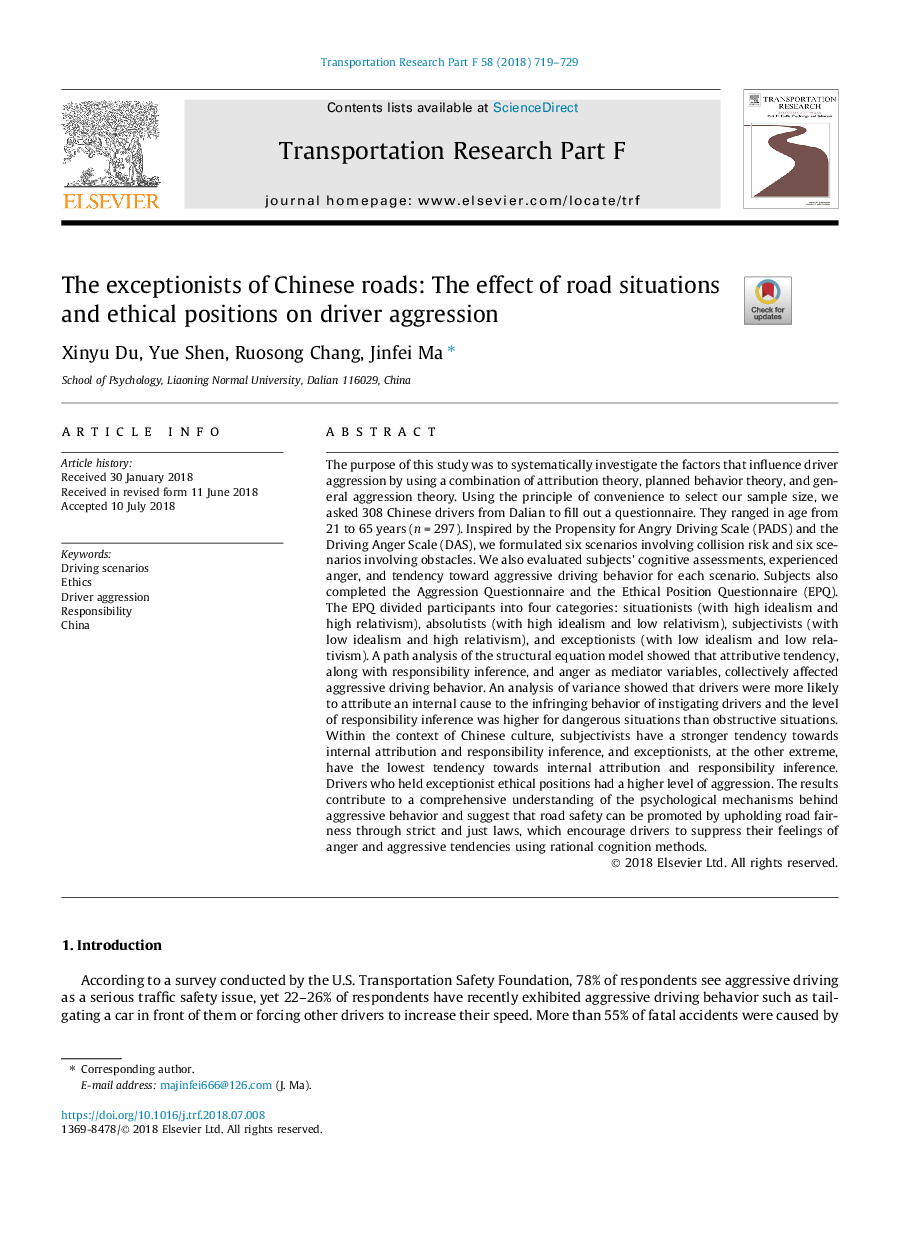| کد مقاله | کد نشریه | سال انتشار | مقاله انگلیسی | نسخه تمام متن |
|---|---|---|---|---|
| 7257712 | 1472429 | 2018 | 11 صفحه PDF | دانلود رایگان |
عنوان انگلیسی مقاله ISI
The exceptionists of Chinese roads: The effect of road situations and ethical positions on driver aggression
ترجمه فارسی عنوان
استثنایی از جاده های چینی: تاثیر موقعیت جاده ها و موقعیت های اخلاقی در تجاوز راننده
دانلود مقاله + سفارش ترجمه
دانلود مقاله ISI انگلیسی
رایگان برای ایرانیان
کلمات کلیدی
سناریوهای رانندگی، اخلاق، تجاوز راننده، مسئولیت، چین،
موضوعات مرتبط
علوم انسانی و اجتماعی
روانشناسی
روان شناسی کاربردی
چکیده انگلیسی
The purpose of this study was to systematically investigate the factors that influence driver aggression by using a combination of attribution theory, planned behavior theory, and general aggression theory. Using the principle of convenience to select our sample size, we asked 308 Chinese drivers from Dalian to fill out a questionnaire. They ranged in age from 21 to 65â¯years (nâ¯=â¯297). Inspired by the Propensity for Angry Driving Scale (PADS) and the Driving Anger Scale (DAS), we formulated six scenarios involving collision risk and six scenarios involving obstacles. We also evaluated subjects' cognitive assessments, experienced anger, and tendency toward aggressive driving behavior for each scenario. Subjects also completed the Aggression Questionnaire and the Ethical Position Questionnaire (EPQ). The EPQ divided participants into four categories: situationists (with high idealism and high relativism), absolutists (with high idealism and low relativism), subjectivists (with low idealism and high relativism), and exceptionists (with low idealism and low relativism). A path analysis of the structural equation model showed that attributive tendency, along with responsibility inference, and anger as mediator variables, collectively affected aggressive driving behavior. An analysis of variance showed that drivers were more likely to attribute an internal cause to the infringing behavior of instigating drivers and the level of responsibility inference was higher for dangerous situations than obstructive situations. Within the context of Chinese culture, subjectivists have a stronger tendency towards internal attribution and responsibility inference, and exceptionists, at the other extreme, have the lowest tendency towards internal attribution and responsibility inference. Drivers who held exceptionist ethical positions had a higher level of aggression. The results contribute to a comprehensive understanding of the psychological mechanisms behind aggressive behavior and suggest that road safety can be promoted by upholding road fairness through strict and just laws, which encourage drivers to suppress their feelings of anger and aggressive tendencies using rational cognition methods.
ناشر
Database: Elsevier - ScienceDirect (ساینس دایرکت)
Journal: Transportation Research Part F: Traffic Psychology and Behaviour - Volume 58, October 2018, Pages 719-729
Journal: Transportation Research Part F: Traffic Psychology and Behaviour - Volume 58, October 2018, Pages 719-729
نویسندگان
Xinyu Du, Yue Shen, Ruosong Chang, Jinfei Ma,
